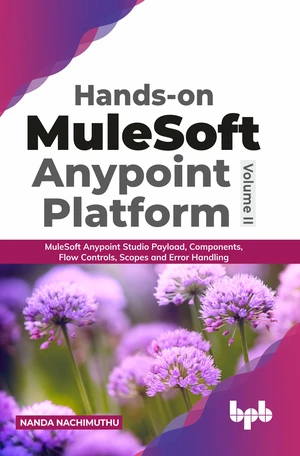Hands-on MuleSoft Flows using MuleSoft Anypoint Studio Components and understanding Payload processing along with debugging. Key Features; Get familiar with the MuleSoft Anypoint Studio key techniques such as Payload, Logger, Variables, Flow and Flow Reference.; Deep dive into Massage Structure and Payload value handling.; Get familiar with the Global Configuration Properties and Securing properties.; Explore Mule Run Time and Deploying Mule Projects in CloudHub. Description This book is aimed to teach the readers how to design RAML APIs using Anypoint Platform. It also focuses on popular topics such as System Integration, API Led Connectivity, and Centre for Enablement and RAML. It will show how to use, call and test free mock REST APIs. The readers can also work with some commercially available license-based APIs. Furthermore, the book will explain most of the examples provided by RAML.org so that you can simulate it from your local system. This book will then help you develop your RESTful API specification for adding, retrieving, updating and deleting data for a business entity. Later, you will learn how to use the MuleSoft Anypoint Platform Designer for designing and simulating your RAML API design specifications. By the end, you will be able to develop an end to end RAML API using the MuleSoft Anypoint Studio. What you will learn; Get exposed to Payload handling, logging and variables; Work with different Flow Control components such as Choice, First Successful, Round-Robin and Scatter Gather; Explore and work with Error Handling components such as Error Handler, On Error, Continue, On Error Propagate and Raise Error; Understand Global Configuration Properties and Securing properties; Gain knowledge about various scopes involved in MuleSoft Flow designing. Who this book is for This book is meant for anyone interested to become an API designer. Experienced technical persons of the IT industry also can utilize the book to get extra insights, and they can align their knowledge in line with it. Table of Contents 1. Start Project 2. Anypoint Studio Components 3. Flow Control Components 4. Idempotent, Parse Template and Scheduler 5. Payload Component 6. MUnit 7. MuleSoft Runtime 8. Global Secured Configurations 9. Error Handling 10. RAML and Anypoint Studio About the Authors Nanda Nachimuthu is an Engineering graduate from Tamil Nadu Agricultural University, Coimbatore, and has completed Advanced Diploma from the Indian Institute of Technology, Kharagpur, in the field of Java and Internet Computing. He has also completed an Advanced Diploma from Indian Institute of International Trading, Delhi, which specializes in Strategies for International Business. He has 25 years of experience in various domains like banking, healthcare, government, and airlines. He’s into technologies like Java, Big Data, Cloud, ESB, Security and IoT. He has taken up various roles like technical architect, solutions architect, cloud architect, and enterprise integration architect and always wanted to take up an individual contributor’s role with hands-on coding experience. He is passionate about social entrepreneurship and takes pro-bono consultations in multiple fields like information technology, manufacturing, trading, agriculture, and internet of things. The founder of some social platforms, he also has a few trademarks under his kitty. Presently, he is focusing on integration technology platforms like MuleSoft, where he finds a wide scope in the future for digital marketing and machine to machine communication. Github Link : github.com/nanda3008. LinkedIn Profile : https://www.linkedin.com/in/nanda3008/.
Price history
Sep 14, 2022
€14.49

